Advances of surface-enhanced Raman and IR spectroscopies
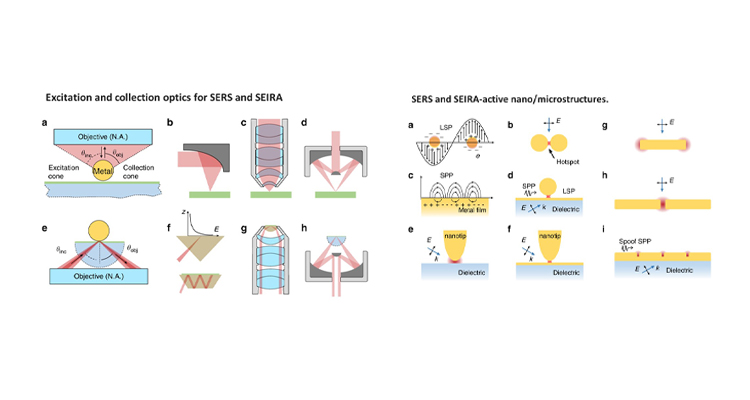 Dr Rajapandiyan Paneerselvam from the Department of Chemistry has published a paper titled “Advances of surface-enhanced Raman and IR spectroscopies: from nano/microstructures to macro-optical design” in the journal Light: Science & Applications, Volume 10, Article number: 161 (2021) having an Impact factor of 17.7.
Dr Rajapandiyan Paneerselvam from the Department of Chemistry has published a paper titled “Advances of surface-enhanced Raman and IR spectroscopies: from nano/microstructures to macro-optical design” in the journal Light: Science & Applications, Volume 10, Article number: 161 (2021) having an Impact factor of 17.7.
Raman and infrared (IR) spectroscopy are powerful analytical techniques, which are widely used for a variety of applications including food analysis, environmental analysis, chemical, and biomolecule analysis. This review article presents some latest advancements in vibrational spectroscopic techniques, and further developments in this field are given with emphasis on emerging techniques and methodologies.
This article has been published with Prof Zhong-Qun Tian’s group, State Key Laboratory of Physical Chemistry of Solid Surfaces, Collaborative Innovation Center of Chemistry for Energy Materials, College of Chemistry and Chemical Engineering, Xiamen University, Xiamen, 361005, China.
Furthermore, Dr Rajapandiyan’s research group will focus on the development of plasmonic nanostructures for surface-enhanced Raman spectroscopy and its applications in food science, spectroelectrochemistry, and microfluidics in the future.
Read the full paper here: https://doi.org/10.1038/s41377-021-00599-2
- Published in Chemistry-news, Departmental News, News, Research News
PhD scholars engage in conversation with Pro-Vice-Chancellor
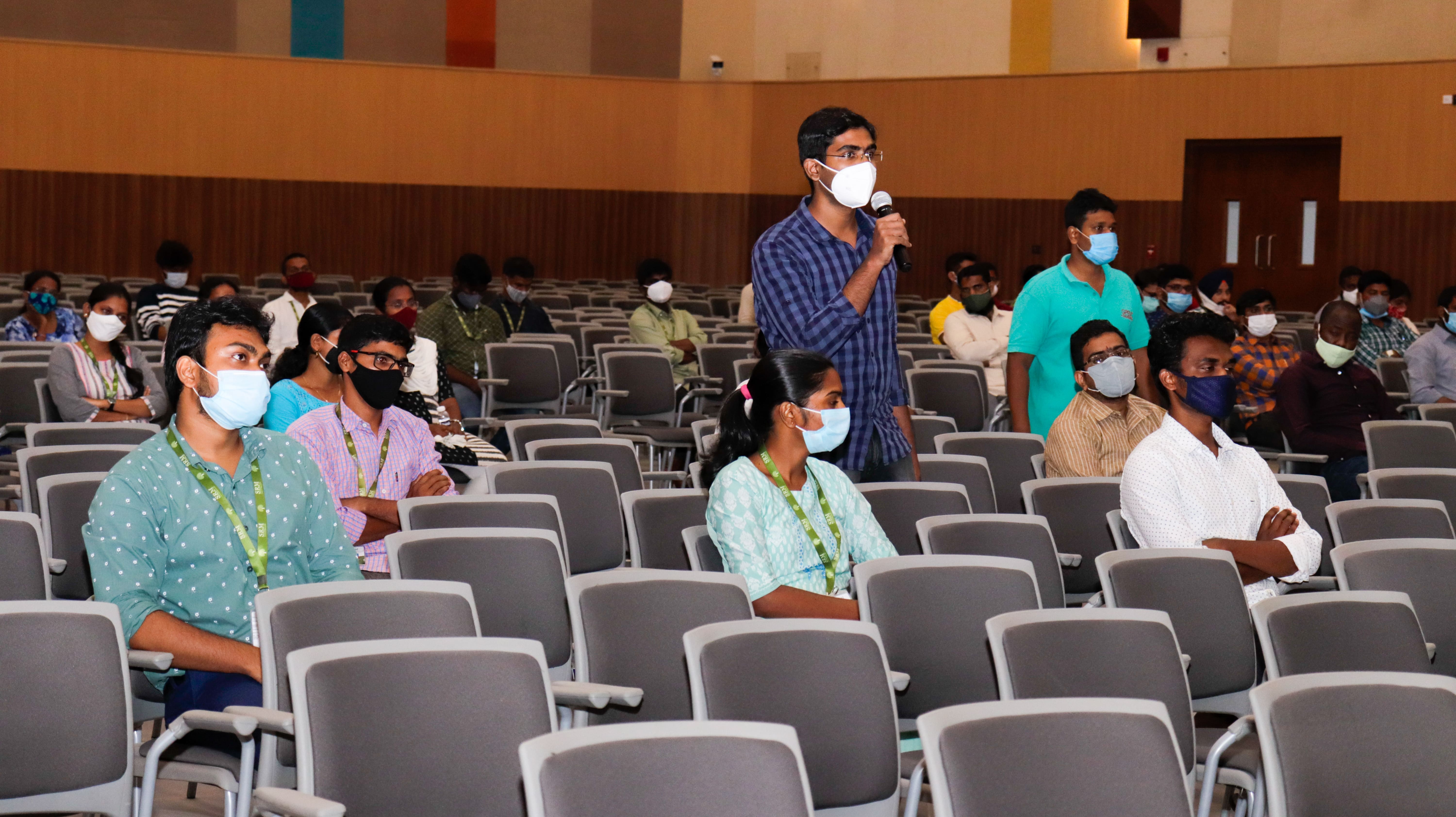 A conversation session between Prof D Narayana Rao, Pro-Vice-Chancellor and the research scholars of SRM University-AP was held on August 10, 2021. On this occasion, Prof Ranjit Thapa’s research scholar from the Department of Physics and Dr Nimai Mishra’s research group from the Department of Chemistry were felicitated for their sustained progress in carrying out research.
A conversation session between Prof D Narayana Rao, Pro-Vice-Chancellor and the research scholars of SRM University-AP was held on August 10, 2021. On this occasion, Prof Ranjit Thapa’s research scholar from the Department of Physics and Dr Nimai Mishra’s research group from the Department of Chemistry were felicitated for their sustained progress in carrying out research.
Prof D Narayana Rao elaborated on the state of the art research facilities that SRM University-AP provide to carry out research 24×7. The university has completely centralized laboratories and the scholars can use any lab and equipment depending on the nature of their research. Well furnished lab spaces and working models with fire/safety and security provisions, modernized synthesis equipment and High-end characterization equipment, and fabrication facilities are available for custom made research.
X-ray diffractometer lab; Advanced Materials Laboratory with Radiant Ferroelectric analyser (DST project), custom made furnace for impedance measurements; Applied Nano Materials Lab with Electrochemical reactor, Photochemical reactor, Potentiostat-single channel; Genetics of Aging Laboratory; Colloidal Chemistry Laboratory; Organic Synthesis Lab; are few among the numerous laboratories that SRM University-AP extend to vigorous research projects that are being carried out on our campus.
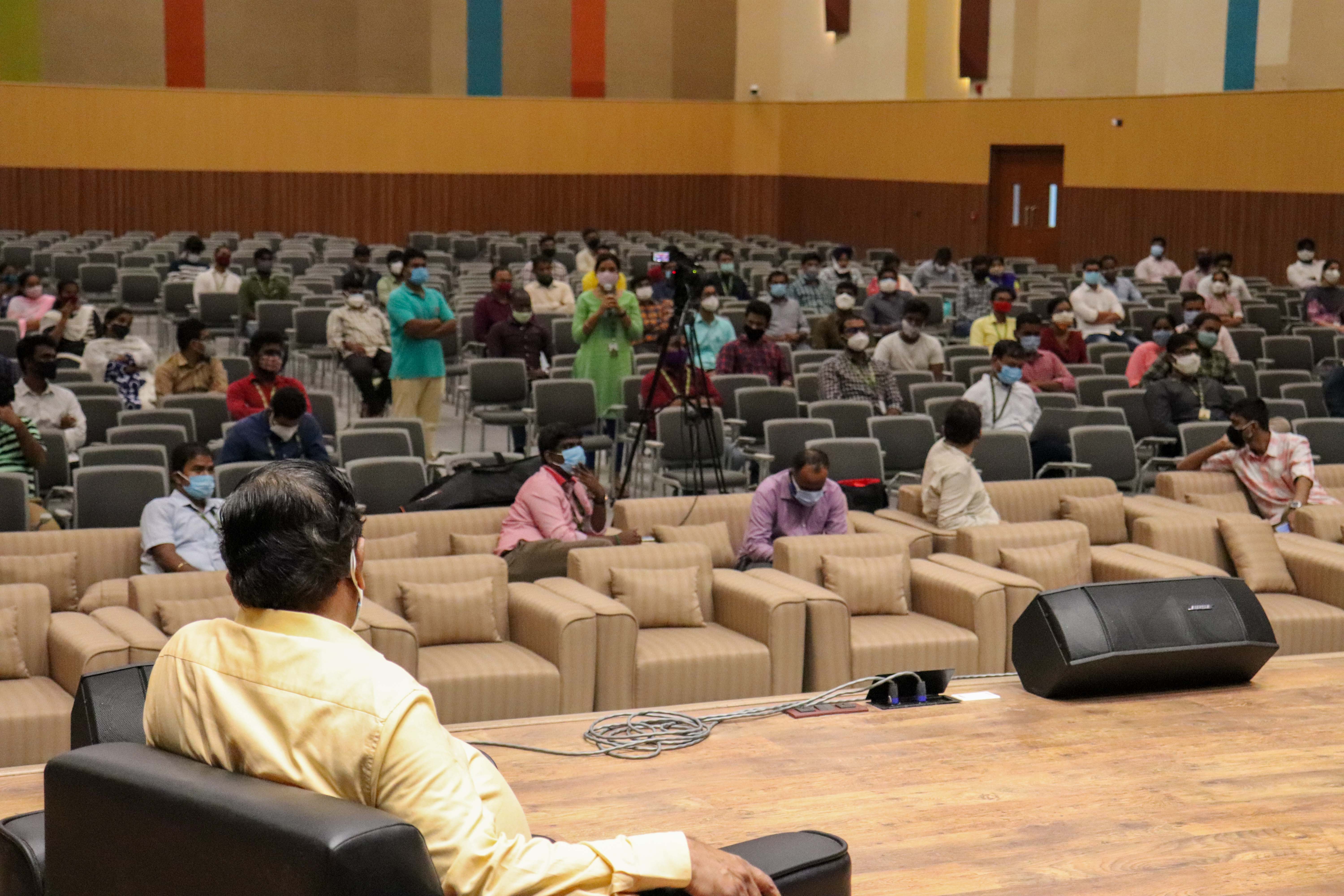
Faculty members and PhD students have published papers in top-ranking journals like Nature, Nature Microbiology, Advanced Energy Materials, Journal of American Society (JACS), Advanced Functional Materials, Advanced Sciences, ACS Nano, IEEE Journals etc The university conducts joint research programmes with NARL, ISRO/DoS and has two industrial projects.
Dr Nimai Mishra expressed that the university has been supportive in moulding young and vibrant researchers. “The scholars of SRM University-AP match up to the level of students from IITs, presenting papers in international conferences and publishing articles in Scopus indexed journals”, he added. Lately, Vasavi Dutt Vankadaru, one of the brilliant minds working on perovskite nanocrystals for light-emitting application, along with Akhil Syed, delivered flash presentation ( e-Poster) at an international conference organised by the Indian Society for Radiation and Photochemical Sciences (ISRAPS).
- Published in News, Research News
Heterojunction photocatalyst for the degradation and mineralization of pharmaceutical effluent: Clozapine
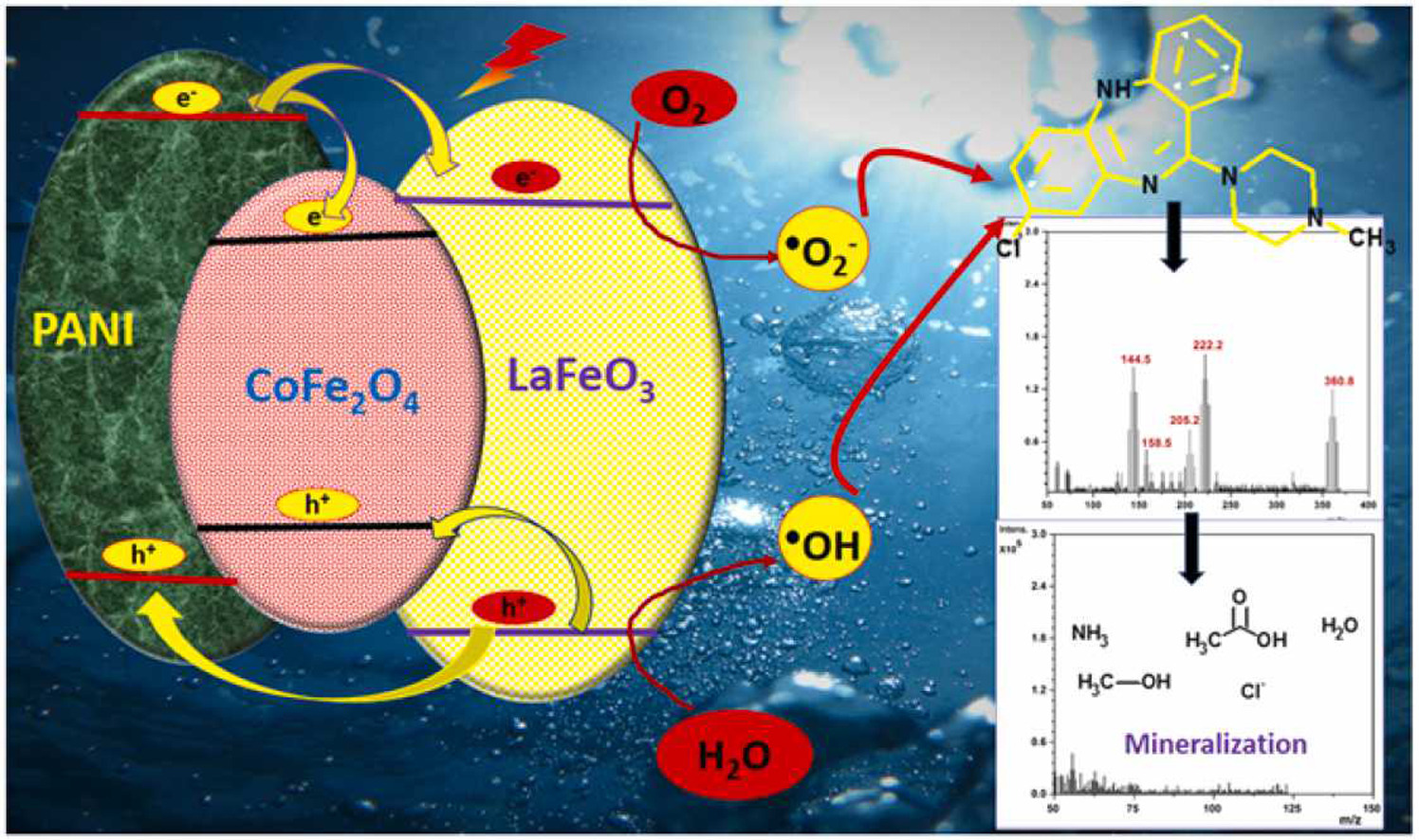 A research paper titled “Robust visible light active PANI/LaFeO3/CoFe2O4 ternary heterojunction for the photo-degradation and mineralization of pharmaceutical effluent: Clozapine” has been published by Dr Lakhveer Singh from the Department of Environmental Science at SRM University – AP, as a co-author, in Journal of Environmental Chemical Engineering, having an Impact Factor of 5.90.
A research paper titled “Robust visible light active PANI/LaFeO3/CoFe2O4 ternary heterojunction for the photo-degradation and mineralization of pharmaceutical effluent: Clozapine” has been published by Dr Lakhveer Singh from the Department of Environmental Science at SRM University – AP, as a co-author, in Journal of Environmental Chemical Engineering, having an Impact Factor of 5.90.
Clozapine (CZP) is a second-generation antipsychotic medicine prescribed for the treatment of resistant schizophrenia. The reported side effects of CZP includes cardiometabolic, orthostatic hypotension, tachycardia, seizures, myocarditis, weight gain and obesity. In this research, a novel magnetic ternary PANI/LaFeO3/CoFe2O4 (PLC) heterojunction photocatalyst was developed for the degradation and mineralization of pharmaceutical effluent: Clozapine. The photocatalysts were found to be re-usable for 5 consecutive cycles.
This work has been in collaboration with Central University Jammu. The present study has a new insight into the development and fabrication of efficient ternary heterojunction towards promising application prospects in wastewater remediation.
Dr Lakhveer Singh is an Editorial Board member of the Journal of Biomass Conversion and Biorefinery – Springer (I.F. 2.60) and a Guest Editor for Bioresource Technology Reports- Elsevier.
Read the full paper here: https://doi.org/10.1016/j.jece.2021.106159
- Published in Departmental News, ENVS News, News, Research News
K Jeevan Sai from CSE lands in NielsenIQ with 11.79 LPA
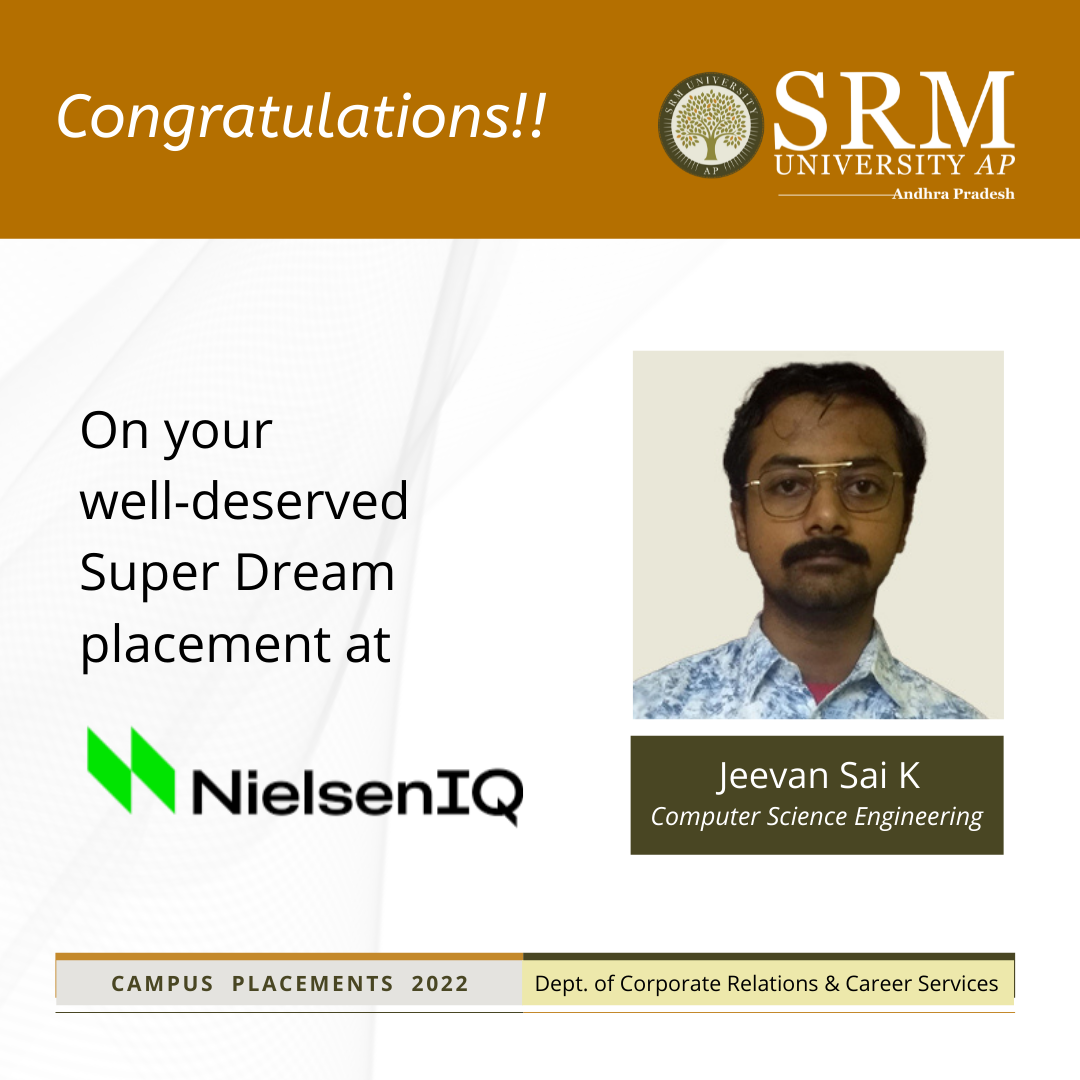 Kanaparthi Jeevan Sai, a B Tech final year student from the Department of Computer Science & Engineering, has secured an exciting job offer with an annual salary package of 11.79 lakhs from NielsenIQ, an industry leader in data points, detailed intelligence, and solutions. He will join the organisation as a full-time Java Software Engineer and work from the Chennai location.
Kanaparthi Jeevan Sai, a B Tech final year student from the Department of Computer Science & Engineering, has secured an exciting job offer with an annual salary package of 11.79 lakhs from NielsenIQ, an industry leader in data points, detailed intelligence, and solutions. He will join the organisation as a full-time Java Software Engineer and work from the Chennai location.
NielsenIQ Consumer LLC is a dream destination for students who specialize in core areas of engineering. For the first three years, the university provided the students with the basics of programming, technical languages, data structures and algorithms. And later in the final year, the placement cell designed student-specific intensive training for all students aspiring for high-paying jobs. The training also covered all the possible model questions for coding rounds and discussed the pattern of previous years.
Jeevan Sai says that the projects need to be presented according to the company and it is important that the resume is well-written and simple. “Group discussions and some of the sessions which helped us to improve our personal and interview abilities and public speaking were arranged by the Department of CR&CS in association with Barclays (also a company). These and were led by industry experts. I thank the placement department for being very active throughout the placement season and clearing our doubts effectively, “Jeevan Sai stated.
- Published in CR&CS, CR&CS NEWS, CSE NEWS, Departmental News, News, Students Achievements

